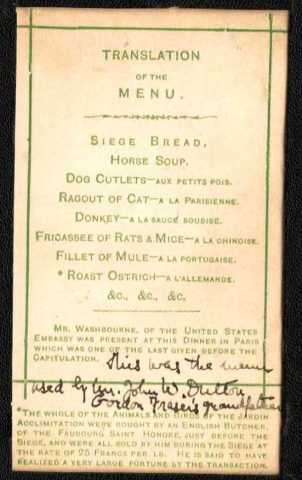
In September 1870, the Prussian army, led by future German emperor Wilhelm I, laid siege to Paris. The city was well defended so the Prussians decided to force a surrender by blockading and starving it.
The city remained defiant but by early November, the meat larders of Paris were almost empty. With no beef, pork or mutton available, Parisians began to consume what they quaintly referred to as “variety meats”.
The first to appear in butcher shops and on menus was horse meat, as the city’s pet horses, working horses and racehorses were butchered and sold off. Dogs, cats and rats were also gathered for human consumption. The flesh from an “ordinary dog” sold for four or five francs a pound but a “trained dog” could fetch almost twice that amount. A dressed or smoked rat sold for two or three francs while a whole cat could fetch as much as 12 francs.
A correspondent named Vizetelly spoke favourably of cat meat, which:
“..when broiled and seasoned with pistachio nuts, olives, gherkins and pimentos… proved a very dainty dish.”
A few animals survived, including the zoo’s big cats, the hippopotamus and the primates, as recorded by Labouchere:
“All the animals in the Zoological Gardens have been killed except the monkeys. These are kept alive from a vague Darwinian notion that they are our relatives, or at least the relatives of some of the members of the government.”
Two less fortunate animals were the zoo’s male elephants, Castor and Pollux. Both animals were purchased for 27,000 francs by a Parisian grocer and dispatched with 33-millimetre bullets, before being carved up and sold at exorbitant prices. Only wealthier Parisians could afford a slice of pachyderm, but according to Labouchere, elephant meat was nothing to write home about:
“Yesterday I had a slice of Pollux for dinner. Pollux and his brother Castor are two elephants that have been killed. It was tough, coarse, and oily. I do not recommend that English families eat elephant, as long as they can get beef or mutton.”
In early January 1871, the Prussians started bombarding Paris with heavy artillery. After sustaining three weeks of artillery fire, the French surrendered on January 28th. The victorious Prussians then lifted their siege and sent wagonloads of food into the starving city.
Source: Henry Vizetelly, Paris in Peril, 1882; Henri Labouchere, Diary of a Besieged Resident in Paris, 1871. Content on this page is © Alpha History 2019-23. Content may not be republished without our express permission. For more information please refer to our Terms of Use or contact Alpha History.
